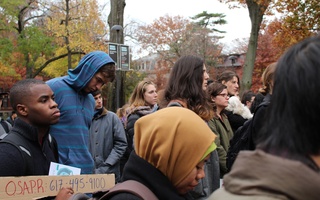Harvard’s lawyers made the case to dismiss a lawsuit brought by Alyssa R. Leader ’15, who alleged widespread misconduct by Harvard administrators in handling her sexual harassment claims, in the first court hearing for the suit Friday.
Harvard moved to throw out Leader’s case in a series of filings over the summer, arguing that Harvard’s response to her sexual harassment claims do not constitute a violation of the federal anti-sex discrimination law Title IX. Months later, Leader’s attorney filed opposing motions challenging Harvard’s arguments.
Leader’s counsel, led by Irwin M. Zalkin, maintained that Harvard acted with “deliberate indifference” throughout its 2015 investigation of her claims that she was sexually abused by a fellow Harvard student—referred to in the suit as “John Doe”—during their “dating relationship.” According to a 1999 decision by the Supreme Court, a deliberately indifferent school may be held responsible for private student-to-student sexual assault when that assault is determined to deprive the victim of educational opportunity.
Harvard’s lead counsel, including O’Melveny & Myers’s Apalla U. Chopra and Harvard Law graduate Danielle C. Gray, countered the allegation of “deliberate indifference,” arguing that Harvard took appropriate steps to investigate Leader’s claims and offer her support services. Pointing to Harvard’s attempts to separate Leader from her alleged assailant, Chopra held that Harvard’s offers to relocate Leader and issue a no-contact letter were sufficient remedy to satisfy Title IX.
“[Leader] alleges only that Harvard should have conducted its investigation differently, or provided her with remedial options more to her liking,” Harvard’s filings read. “She fails to plausibly allege that Harvard breached any duty owed to her or that Harvard’s conduct was the proximate cause of her alleged injuries.”
Harvard's counsel also refuted Leader’s charges that the University was negligent in its response, claiming that any retaliatory actions perpetrated by Doe or his friends were not “reasonably foreseeable.” Based on the investigation, Chopra argued that Harvard did not put additional students at risk or jeopardize a safe environment on campus.
Zalkin pushed back, arguing it was a "serious problem" that Harvard was unwilling to remove John Doe from the same dorm, even though Leader successfully filed for a restraining order in civil court. Only then did Harvard remove Doe from Cabot House and leave Leader in her residence.
Massachusetts federal judge Denise J. Casper presided over the court hearing, challenging Harvard’s counsel to defend their motion to dismiss the case wholesale. But Casper also grilled Zalkin, pushing him to clarify the ways in which Harvard’s remedial offers to Leader were insufficient.
Following the proceedings in Boston, Zalkin explained why he thought Harvard’s offers failed to meet acceptable remedial options.
“A mutual restraining order, in this case, where they’re both living in the same facility, they’re working in the same employment, is not manageable,” he said. “Not without putting an undue and unreasonable burden on her.”
Scrutiny into Harvard's Title IX compliance is not new. In 2014, the United States Department of Education found Harvard Law School in violation of Title IX, and the government is also currently investigating the the College’s compliance with Title IX.
Read more in University News
Two HKS Students Call for Greater Civic EngagmentRecommended Articles
-
Students View Movies And Cut Reading Time in Half390 students are going to the moves every day this term. They are trying to learn to read faster. All
-
 New Suit Further Scrutinizes Harvard’s Title IX Compliance
New Suit Further Scrutinizes Harvard’s Title IX Compliance -
Court Denies Harvard Motion to Dismiss Title IX LawsuitA lawsuit that challenges Harvard’s compliance with anti-sex discrimination law Title IX will proceed after a federal court ruled Friday to deny the University’s efforts to dismiss the suit.
-
 Harvard, Plaintiff Propose Schedule for Sexual Harassment Case
Harvard, Plaintiff Propose Schedule for Sexual Harassment Case -
 Student Alleges in Suit That Harvard Discriminated Against Him in Title IX Case
Student Alleges in Suit That Harvard Discriminated Against Him in Title IX Case













